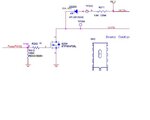urnuj
Junior Member level 3

Hi
I have set up a PWM which is working before and has been tested to be able to change its duty cycle.
But after adding in other peripherals it does not work and generate the signal anymore.
Is there a reason why this is happening and what should be checked to find the problem?
Thanks a lot for helping.
Regards
I have set up a PWM which is working before and has been tested to be able to change its duty cycle.
But after adding in other peripherals it does not work and generate the signal anymore.
Is there a reason why this is happening and what should be checked to find the problem?
Thanks a lot for helping.
Regards

